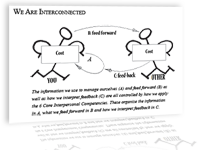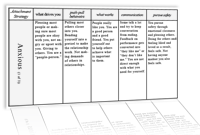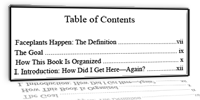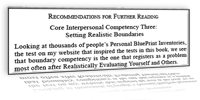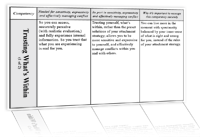No More Faceplants Book Reviews
A Field Guide for Better Living; toolkit included.
Dr. Wolf's book No More Faceplants is actually a toolkit. It is the perfect toolkit we need to manage our self-talk so that our inner conversations are productive, to develop a better relationship with our self, and to have an altogether better life as a result. I look at the book as A Field Guide for Better Living; toolkit included. It is a handy book to have along on life's long ride, especially when we find ourselves occasionally sidelined due to a Faceplant.
Dr. Wolf has taken the time to carefully spell out the intricacies of how we Faceplant our lives from time to time, and even more importantly, taken the time to write the how-to manual for conducting our lives in a way to avoid Faceplants. The concepts are sophisticated, so we need to be in a calm and receptive mode to read the details carefully, take them in and understand them.
The tools are useful and can be immediately applied to everyday life. For example, when I finished reading the book, I looked around my house and immediately saw a simple (but strongly emotionally charged) situation that I am now able to step back from, rationally consider my best options, and handle the situation better than before, with the skills I learned in this book.
In the first half of the book Dr. Wolf describes how the brain works, exactly how attachment strategies are developed when we are young, and precisely how those strategies continue to guide us, and sometimes undermine even our best efforts, as adults. He teaches us how to become aware of what is driving us and why we feel urges to act in certain ways, even though those certain ways might not be in our best interests (leading to faceplants).
The second half of the book presents the tools, the ultimately useful interpersonal skills, we need to manage our relationships and have the best life possible.
I very much enjoyed Dr. Wolf's extensive use of patient and doctor dialog as a method to present the details of the conceptual material because he presents not only the information but also demonstrates ways people incorporate the information into their thinking. Dr. Wolf's writing style brings what could be otherwise dry material warmly to life and offers a fully compassionate, humane look at our shared human condition. The book is packed full of ideas; not just a few ideas expanded on for the sake of rhetoric, but tons of worthwhile and useful concepts, page after page.
I recommend this book to folks who are ready for the challenges and rewards of real personal growth. And, for those who are seeking to find their most authentic self, and inner peace and calm, all while still striding along, amidst and within this great process we call life.
– T. Keppler
"No More Faceplants is a wise, savvy, compassionate book for people ready to do the work of change. Gordon Wolf is there to help you, and he does it with no judgment and no nonsense. Fair warning: You might feel, as you read, as though someone is peeking directly into your soul."
– Ann Weiser Cornell, author of The Power of Focusing and The Radical Acceptance of Everything
I Wish I Had Read This 40 Years Ago
This book will change your life for the better. Its foundation is a theory of human behavior that has been validated in hundreds of empirical studies. It shows that our behavior as adults links to how we learned to be emotionally safe as a child. The problem is that sometimes those early strategies for coping as a child don’t work in the environment we face as adults. Hence, face plants. While the theory is convincing and well-explained, the power of the book for me is understanding the 6 Core Competencies an adult needs to master to avoid the face plants that plague us all. I found the short self-tests with each of the competencies to be spot on for the areas I need to work on. There is good advice for how to improve in each of the competencies and a unselfish pointers to other books to delve further into any competency area where more work is needed. I am getting so much out of this book that I bought another for a family member who wants to work on her chronic anxiety. I only wish it had been written years earlier.
– John P. Thompson
Wolf writes a fascinating collection of chapters that transcends most self-help books, with research, tested ideas and logical explanations for human patterns we work to reverse continuously throughout life.
Rather than offering 12 steps or a system to rearrange one’s life, Wolf takes a more realistic and lifelong approach to the subject of avoiding “faceplants,” or patterns of self-defeat that readers all face throughout life. These faceplants are engrained behaviors or pathologies that keep us from moving forward toward success. They can come in the form of a lack of self-care due to an unbalanced devotion to others or a creation of dysfunction due to belligerently speaking one’s mind. While occasional faceplants continue throughout life, Wolf frames an educational guide that leads to awareness, not avoidance. One of the biggest defenses against faceplanting, for example, is self-security. Wolf explains that someone emotionally secure understands how to set boundaries and make informed decisions. By assessing what we want and who we are, we become intimate with ourselves and learn to create emotional safety. That safety, according to Wolf, is a key factor in diminishing patterns of repeated behavior that land us in undesirable situations. Perhaps what’s most unique about the concept is that it can be applied to so many aspects of life. Faceplanting happens in relationships, careers, child-raising, family dynamics and even personal health. Another recurring concept in the book is “inner chatter,” or the ideas or models we’ve become accustomed to hearing in our heads when certain events occur. For example, one faceplant might involve deflecting each time you hear a compliment, since internal chatter suggests that flattery creates vulnerability and ultimately weakness. Wolf explains clearly how to isolate these “inner chatters” and assess them based on how well they’ve assisted you so far. From interviews with anonymous patients about relationship patterns to anecdotes about nameless faceplanters who discovered the keys to seeing their repetitive missteps, Wolf uses a history of observation to offer steps toward awareness rather than prepackaged solutions. With such an array of testimonials and client observations, many (if not all) readers will recognize some behavioral pattern or faceplant of their own. With more than 30 years of experience in talk therapy and behavioral experiments, Wolf seems to effortlessly demonstrate that major life changes only need be a series of small changes, decisions and commitments to personal emotional health.
A well-organized, thoughtful and thoroughly researched book that covers a wide array of emotional issues using universal concepts.
“Kirkus Reviews”
A Self-help Book That Really Helps
Gordon Wolf, Ph.D., has written a very approachable book on Attachment Theory. No More Faceplants is written primarily for the lay person who wants to understand how to identify, understand, and end the behaviors that inevitably cause us to fall flat on our faces when all we are trying to do is stay secure. I like the personable style in which the book is written. Dr. Wolf gives just the right amount of theory, but then he demonstrates what the various attachment styles look like through client dialogues and stories that bring them to life. The book also contains many self-evaluation quizzes and comprehensive charts that helped me compare styles and identify my primary attachment strategy.
There is a generous how-to section (half the book, at least) which is my favorite part of any self-help book, and this one does not disappoint. It shows how to change the harsh self-criticisms that create recurrent problems and develop six Core Competencies and three interpersonal skill sets that make it possible to work with, learn from, and shift familiar kinds of conflicts. I highly recommend this book.
There is a lot of information in this book, but the steps and action plans follow a pattern that reinforces the information and makes it easy to apply. I highly recommend it.
– Sarah Aschenbach, author of Relationships Made Easy: How to get along with all kinds of people
"This book teaches us why we make the same mistakes over and over and gives us the tools on how to change that pattern. I have read numerous books on relationships between parents and children, but this book explains much more. I highly recommend this book."
– C Kirby
A Tough, Scientific Relationship Guide
“No More Faceplants: The Choice at the Fork in Your Life’s Path” by Gordon Wolf, Personal Blueprint Publishing, Napa, California, 2012. 399 pages, paperback
This book isn’t for the faint of heart. It’s challenging because it immediately makes demands of the reader. But it makes a dense subject engaging through real-life and imaginary vignettes of people in relationship difficulties and how they might get themselves out of predicaments that arise due to genetics, family, upbringing, and social environment while growing up. The basic reason that people get into trouble with other people is that they apply “attachment strategies” that they learned long ago, but which no longer work. They learned to deal with an alcoholic father or an overbearing mother by shutting down and avoiding personal communications, for example. This behavior will not work when you are employed as a marketer, company spokesman, or teacher. How do we change our “attachment strategies”? We start working on ourselves: We discover our main attachment strategy (by taking the tests provided in the book), find out why we have conflicts with others, and set about improving our relationships – with our boss, co-workers, wife, husband, children, or friends. It is therefore a very hopeful book which is dedicated to helping people get on a better track in their relationships.
Personality Types
If you are an “Anxious” person, you are looking for love and trying to please people. You are vulnerable and can’t understand why people sometimes back away from you. If you are a person who practices “Avoidance,” you learned early in life not to let yourself be vulnerable, and you use conflicts as a way of pushing people away to a safe distance. If you have a “Secure” attachment strategy, you have found ways to deal successfully with most relationships and interactions with people. But we humans resist being categorized; most of us practice some kind of “Mixed” strategy – for example a combination of Secure and Avoidance. But we continue making mistakes, or faceplants, and we have to continually adjust our approaches to other people. Therefore this book is ultimately about achieving greater happiness in life. It is concerned with moving from the three “little c’s” (criticism, control, and conditions) to the three big C’s (Care, Concern, and Courage) and reaching the point where we love and admire ourselves and those around us, and where others love and admire us.
Skill Sets and Core Competencies
The three main skill sets of interpersonal behavior are managing: sensitivity, expressiveness, and conflicts. To achieve this, we need to understand six interpersonal competencies: trusting what’s within, realistically evaluating yourself and others, setting realistic boundaries for yourself and others, asking for what you need and living with what you get, effectively managing conflict (especially conflicts you inadvertently started), and recognizing that you are the same as others, but different. Just as there are core competencies for a job, they are there for us to use in improving our relationships with others.
Juicy Real-Life Stories
Dr. Wolf provides illuminating and colorful examples from his practice and even from his own life, and these will be the choicest parts of the book for some readers, because they bring the subject down from theory to a guy who is trying to juggle two girlfriends and his ex-wife (just can’t say “no,” tries to please, wants to be loved: “Anxious”) or a woman who thinks all she needs is uncommitted sexual relationships to balance out her perfectly ordered life: “Avoidance” of vulnerability. Does she “want” those uncommitted sexual relationships or “need” them? What does she really need? Buy the book and find out!
Why Can’t We Be Different?
This book is rigorously argued and has copious references for further reading. The personal tests are easy to take and self-illuminating. There are charts showing competencies and how they can be mismanaged or managed well. There are spaces for the reader to use in keeping a journal of personal behavior, chronicling successes and failures. This book is written at a standard far above that of most therapy books. It presents a model of the ways people behave and techniques for addressing difficulties. It strives to help us answer three questions: Why do we act as we do? Why can’t we be different when we want to be different? What would allow us to become who we’d like to be?
Parents: Quote from the Author
“It occurred to me some years ago that ‘Your parents take you on an emotional bus ride and they drop you off at the last stop they reached.’ You start your own emotional life at that last stop, the point where they stopped growing emotionally. If you are similar to me, your parents hadn’t taken the bus all that far.” (p. 398)
– Dale Craig

